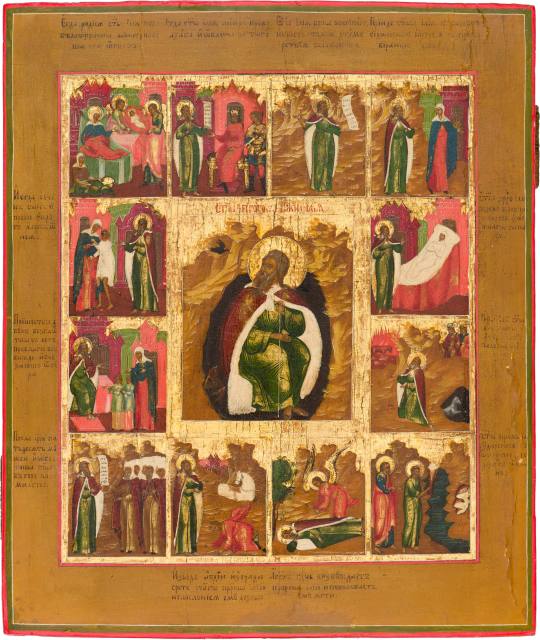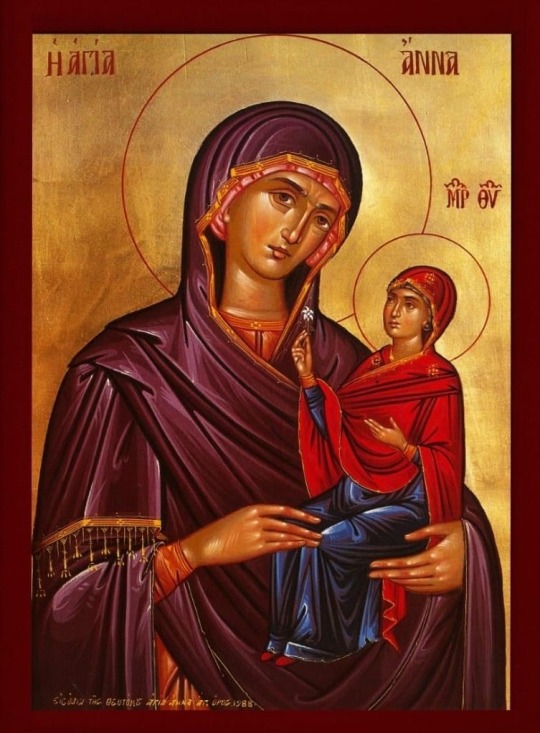#orthodoxchristian
Explore tagged Tumblr posts
Text
The virgin mary is a prayer intercessor. The reason we feel drawn to her is because she is a supportive person. She prays for us. She is compassionate. She preaches love and peace about Jesus and God. God is the only person who has the power to create miracles and destroy evil but the virgin mary is a person who prays for us all the time.
23 notes
·
View notes
Text

There is a peace this world cannot provide.
Source
8 notes
·
View notes
Text

The featured icon depicts one of the most revered saints in Orthodox Christianity — the Prophet Elias. This piece is dated back to the 19th century and was probably painted in Guslitsy. The icon pictures the life of the Prophet, with its centerpiece dedicated to the scene titled “Prophet Elias in the Desert.” The most interesting thing about this specific piece is that it features a rather rare scene depicting Avdius, a servant of King Ahab, who saved Elias from death.
28 notes
·
View notes
Text
Living a Life in Christ
I have classed myself as an Orthodox Christian for almost two years now. Delving into the Orthodox way of life, I will admit hasn't been easy due to the attitudes of non Christians surrounding me.
Ever since I first stepped into an Orthodox church two years ago I was in awe of the calming blue walls and the intense feeling that it was a place close to God. It really touched my heart, clearing my head of all demons. Admittedly, I knew following this path would be an adjustment from the secular path I was on prior. A huge change and in all honesty I am still struggling with some of the sins that are seen as normal in today society.
So I have decided on documenting my progress in leading a life dedicated to Christ, learning and loving.
sending love and prayers to you all,
Elisabeth
#orthodox#orthodoxchristian#iconography#love#church#lovingchrist#christian#bible#orthodoxchurch#prayer#jesusprayer
2 notes
·
View notes
Text

2 notes
·
View notes
Video
youtube
Tsar Nicholas II: the Martyred Emperor
с праздником!
0 notes
Text

Today we commemorate a very beloved Saint of ours, Euphrosynos!! Please take a minute to read this awesome account and true miracle about him from the Synaxarion:
Saint Euphrosynos was a simple-minded peasant who took refuge in a monastery where he was put to work in the kitchen as a scullion doing the most thankless tasks. He became the laughing-stock of everyone but bore all with unshakable generosity of spirit.
There was a godly priest in the monastery who fervently desired that the Savior reveal to him the good things He has in store for those who love Him. One night as he slept, he had the sense of being carried to paradise into a garden full of unutterable delights. Euphrosynos was in the middle of the garden tasting of the good things there and rejoicing with the angels. The priest went up to him and asked where they were. Euphrosynos answered, “This is the dwelling-place of God‘s elect that you have long to see for so many years and I am here because, in His good pleasure, God has forgiven my sins.“ Gazing upon the unutterable good things that “Eye has not seen nor ear heard, neither have entered into the heart of man (1 Cor. 2:9),” The priest observed that they were to some extent, perceptible to those who dwelt there, so he asked Euphrosynos if he might take some of the fruit of the garden away with him. Whereupon Euphrosynos took three apples and put them in the priest’s cloak. Just then he was woken up by the sound of the call to Matins. As he came to himself from what he thought it was a dream, he was amazed to find three apples in his cloak giving off the scent of an unearthly sweetness. He saw Euphrosynos in his usual place in the church and went up to him, begging him to tell him where he had been during the night that had just passed. “Forgive me, Father,” he answered, “but I have been here all the time.“But as the devout priest pressed him earnestly not to conceal the blessings of God, the humble Euphrosynos at last said, “It is true, Father, that I was in the garden where you saw the good things God has in store for his elect and that it was the Lord’s wish to show you this mystery through my unworthiness.“ It was not long before the priest told everyone what he had witnessed and showed the apples by way of proof. The monks were encouraged through this sign to follow all the more zealously the path of virtue, and those who taste the apples were healed of all kinds of disease. As for the blessed Euphrosynos, he fled from the monestery, for there was nothing he feared more than the praise of men.
youtube

Three Apples
Ozias Leduc
oil on strong cardboard, 1887
#Ozias Leduc#art#artist#painter#painting#still life painting#still life#Three Apples#oil on strong cardboard#1887#orthodoxchurch#orthodoxchristianity#orthodoxchristian#orthodox#saint#Euphrosynos#dark#night#chant#gregor palamas
15 notes
·
View notes
Text

Living with Orthodox Christianity in Ethiopia's highlands was a harsh, primitive lifestyle with no trust, primitive farming, and famine. Evil spirits held significant power. A community development team sought guidance from God, leading to a spiritual battle. Reliving events from the Bible, they witnessed a group of people come out of darkness and into light, demonstrating the power of God in transforming lives.
This book shows the power of the gospel to transform lives. Visit https://www.bookslauraleelindholm.com/ to learn more.
9 notes
·
View notes
Text




+++ 🙏🏻God Bless🕊️ +++
Silver Plated .999 Orthodox Icons Mother of God Vladimir, Lord Jesus Christ. Set of 2 icons (6.4cm X 5cm) + Gift - Orthodox Prayer Book
💫 International Orthodox Art Corporation Andcross
May the blessing of the Lord be upon you!
#greek orthodox#orthodox#orthodox christian#orthodox christmas#orthodox church#orthodox icon#orthodoxia#russian orthodox#iconofaday#jesus#prayer book#prayer#orthodoxchristianity#orthodox icons#orthodox brothers#orthodox cross#orthodox christianity#orthodoxy#orthodox gift#gift set#christmas gift
2 notes
·
View notes
Video
youtube
The Plague of Gnosticism in Churches
0 notes
Text

“that at the name of Jesus every knee should bow, in heaven and on earth and under the earth, and every tongue declare that Jesus Christ is Lord, to the glory of God the Father.”
Philippians 2:10-11
Jesuschrist is the most beautiful name that exists. Peace be upon Him. Glory to Jesuschrist our Lord ❤️
#catholic#love#christian#grace#friendship#godly#dating#marriage#empath#Catholicism#christianity#orthodoxcatholic#orthodoxchristian
7 notes
·
View notes
Video
youtube
The ULTIMATE Guide to Byzantine Empire's Rise and Fall #youtube
#youtube#byzantineempire constantinople ancienthistory medievalhistory romanempire justiniani hagiasophia orthodoxchristianity greatschism ottomanemp
0 notes
Text

The featured icon is dedicated to the theme of the Resurrection — the Harrowing of Hades, which was especially widespread in Russia in the 19th century. The Resurrection of Christ is taking up the centerpiece, while the rest of the icon is separated into several rows of border scenes that include the Passion cycle and the Feast cycle, as well as the Monogenis and the images of the Four Evangelists. This beautiful icon was painted in the third quarter of the 19th century, most likely in Palekh, the most prominent icon painting school of the Russian Empire.
13 notes
·
View notes
Text
The Good, The Bad and The Ugly
The idea you can put a label on the people around you seems so judgmental, how can we, inferior to God label and judge those around us. We are all battling our own demons. My fiancé said to me earlier this evening that we were bad Christians. While this may be true, the switch from secular human beings to Christians that have to follow so many new rules we had never encountered before is one of those tasks that takes time to stick. I am fully aware of my wrong doings and consistently pray from the Lord's forgiveness.
My point here is, if you are truly repentant, God forgives even if those sins you struggling to conquer keep coming up in confession. At the end of the day, it is not for us to judge others but to centre our focus on our loving relationship on God. Therefore, if you are feeling discouraged I have this to say- do not give up, God's love will conquer all, do not focus on how good someone is or how bad as you have no idea of where they have come from and what struggles they face.
I hope this finds somebody who needs to hear this, and feels comfort in knowing that whatever your past and your current sins God loves you.
Please pray for me.
sending my love and prayers,
Elisabeth
#orthodoxchristian#orthodoxy#orthodoxchurch#jesusprayer#lovingChrist#sin#confession#orthodoxwoman#marriage#baptism#iconography#religious art#catechumen#prayeroftheheart
1 note
·
View note
Text
As a Saint of early Christianity, the unmercenary St Pantaleimon is venerated by the Catholic and Apostolic Church (eastern orthodox Church) and the Roman Catholic Church.

Saint Pantaleon
275-305
Feast Day: July 27
Patronage: physicians, midwives, livestock, against headaches, consumption, locust, witchcraft, accidents, loneliness, crying children
Saint Pantaleon, one of the 14 Holy Helpers, was born near the Black Sea in Asia to a wealthy pagan father and Christian mother who taught him the faith. As a physician to Emperor Maximianus, Pantaleon became estranged from Christianity through the influences of being in his service. With the help of a holy priest named Hermolaos, Pantaleon reverted back to the faith and gave his fortune and services to the poor. He was martyred during the Diocletian persecution after he implored heaven to forgive his persecutors. He is known as the “Great Martyr”, a “Wonder-Worker” and “Pantaleon the Healer”.
Prints, plaques & holy cards available for purchase here: (website)
50 notes
·
View notes
Text
ICON: THE MOTHER OF GOD "ENLIGHTENER OF MINDS"

Movable holidays first Sunday after the Dormition
This unusual icon comes from the Russian town of Rybinsk, in Yaroslavl province. The Mother of God and the Divine Child are wrapped in what appears to be a priest’s phelonion, and Angels are depicted on either side, holding lighted candles. Beneath the Virgin’s feet and on her head Cherubim are depicted with outstretched wings.The model for this Icon is a statue in the town of Loreto in Italy, which is wrapped in a similar covering.
The “Enlightener of minds” Icon (Подательница ума) reflects the deep faith of Orthodox Christians in the power of the All Holy Virgin to intercede before God and His Son to bestow both temporal and spiritual blessings. Foremost among these is enlightenment of the mind and heart through Divine Truth.
For this reason, parents whose children are slow learners, either in matters of the Faith or in secular knowledge, often turn to the Most Holy Theotokos and her Divine Child, Who is the fount of the loftiest wisdom and knowledge, praying for their children’s minds be strengthened and that they may retain what they are taught. People also entreat the Mother of God to help them overcome delusion and mental illness.
The Enlightener of Minds icon is commemorated on August 15.
Source: OCA
#orthodoxy#orthodoxchristianity#easternorthodoxchurch#originofchristianity#sacredart#icon#virgin mary
29 notes
·
View notes